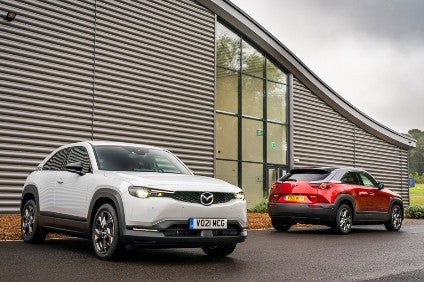
The UK auto industry has criticised cuts to EV car and van plug-in grants announced by the UK government.
The government said the plug-in car, van and truck grant would be targeted at more affordable models to allow more people to make the switch.

Discover B2B Marketing That Performs
Combine business intelligence and editorial excellence to reach engaged professionals across 36 leading media platforms.
“The grant scheme for electric cars, vans and trucks has been updated to target less expensive models and reflect a greater range of affordable vehicles available, allowing the scheme’s funding to go further and help more people make the switch to an electric vehicle,” it said in a statement.
From today (18 March), the government will provide grants of up to GBP2,500 for electric vehicles on cars priced under GBP35,000.
It was previously GBP3,000 on cars costing up to GBP50,000. Until the 2020 budget, the grant had been GBP3,500 for any EV.
"This will mean the funding will last longer and be available to more drivers," the government added.
"Grants will no longer be available for higher-priced vehicles, typically bought by drivers who can afford to switch without a subsidy from taxpayers.
"The number of electric car models priced under GBP35,000 has increased by almost 50% since 2019 and more than half the models currently on the market will still be eligible for the grant, including spacious family cars, such as the Hyundai Kona 39kWh and the MG ZS EV."
The government said measures to encourage people to switch to electric vehicles were also working, with nearly 11% of new cars sold in 2020 having a plug. This was up from just over 3% in 2019 – and battery electric car sales almost tripled over that same period.
The plug-in vehicle grant scheme was renewed last year, with GBP582m of funding intended to last until 2022 to 2023.
Transport minister Rachel Maclean said: "We want as many people as possible to be able to make the switch to electric vehicles as we look to reduce our carbon emissions, strive towards our net-zero ambitions and level up right across the UK.
"The increasing choice of new vehicles, growing demand from customers and rapidly rising number of charge points mean that, while the level of funding remains as high as ever, given soaring demand, we are refocusing our vehicle grants on the more affordable zero emission vehicles – where most consumers will be looking and where taxpayers' money will make more of a difference.
"We will continue to review the grant as the market grows."
The plug-in car grant was introduced 10 years ago to stimulate the early market for zero emission vehicles. Since 2011, the government has provided close to GBP1.3bn in plug-in vehicle grant funding to bring ultra-low emission vehicles onto UK roads, supporting the purchase of more than 285,000 vehicles.
"We have been clear since 2018 that we intend to reduce the plug-in car grant. We are retaining support for the switch to electric vehicles through other new investments. Today's changes are the latest step in this," the government statement said.
"Generous tax incentives, including favourable company car tax rates, which can save drivers over GBP2,000 a year, will remain in place.
"The government is also investing more than GBP15bn of new money in alternatives to cars, including GBP3bn for buses, GBP2bn for cycling,
more than GBP4bn for local transport in cities, GBP5bn for enhancements to the rail network, including electrification and reopening lines closed under the Beeching cuts."
It added more affordable batteries mean manufacturers can increase the range of the vehicles, including the VW ID.3 Pro (from GBP32,000 RRP) with a 263-mile range. This is more than three times the typical range available when the plug-in car grant first launched in 2011, thanks to steep falls in battery costs.
"As the market develops even further, we expect further price reductions in electric vehicles," it concluded.
Mike Hawes, SMMT chief executive, said: "The decision to slash the Plug-in Car Grant and Van & Truck Grant is the wrong move at the wrong time. New battery electric technology is more expensive than conventional engines and incentives are essential in making these vehicles affordable to the customer.
"Cutting the grant and eligibility moves the UK even further behind other markets, markets which are increasing their support, making it yet more difficult for the UK to get sufficient supply. This sends the wrong message to the consumer, especially private customers, and to an industry challenged to meet the government's ambition to be a world leader in the transition to zero emission mobility."
Graham Hoare, chairman, Ford of Britain, said: "Today's news from the UK government that plug-in grants for passenger and commercial vehicle customers are being reduced is disappointing and is not conducive to supporting the zero emissions future we all desire.
"Robust incentives - both purchase and usage incentives - that are consistent over time are essential if we are to encourage consumers to adopt new technologies, not just for all-electrics but other technologies too like PHEVs that pave the way to a zero emissions future."






